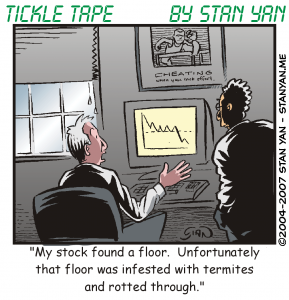Trading isn’t always rewarding, at least in the traditional way we view monetary rewards. When one works a traditional 9-to-5 job, for example, he or she puts in 40 hours and gets a paycheck. And depending on the job, that paycheck comes regularly, regardless of how well one performed during the 40-hour workweek. Trading, in contrast, isn’t a traditional job. If you don’t make enough winning trades, you don’t take home any profits. Essentially, a trader can work a solid 40 hours and see nothing for it. But that doesn’t mean you shouldn’t receive any rewards. If you’ve done a good job of trading by managing your risk, outlining a scrupulously detailed trading plan, and flawlessly executing it, you should get something for your efforts, even if you didn’t earn any profits.
When it comes to trading, the long-term objectives are the most important; the ultimate goal is to trade profitably and do so consistently. But it’s often hard to keep this faraway aspiration in mind. If you are a novice trader, for example, you may put in a laudable amount of time and effort putting on trades, but because your skills are below par, you may not see much profit.
Even seasoned traders may face times when they end up losing money. So if you only feel rewarded when profits roll in, you’ll often put in a superb effort and receive no rewards. As many motivational theorists will tell you, when people put in a lot of effort and receive no rewards, they eventually just give up.
If your goal is to become a consistently profitable trader, you can’t give up prematurely. You must persist, build up your trading skills, and keep at it until you become a master trader. How do you persist in an endeavour where the rewards are inconsistent, or even non-existent? Set up a reward schedule in which you give yourself a reward after you have completed a well-defined and significant goal.
Rewards can be either tangible or intangible. For example, you can set up a schedule where you reward yourself with specific tangible items, such as a night out on the town, a bottle of your favourite wine, or a gourmet dinner. You can also reward yourself in intangible ways, such as thinking, “I’ve done a good job,” when you have reached a goal. A more tangible reward, however, will be more motivating and powerful.
How do you use a reward schedule? It’s vital that you define a specific goal to achieve. The goals you set should match your level of expertise. If you are a novice trader, putting too much pressure on yourself will ultimately produce frustration. Rather than set relatively high-performance goals, such as achieving a 20% profit, you should set a reasonable learning goal, such as saying, “I’ll devote 20 hours this week to learning about trading and putting on a few low-risk practice trades.”
A more skilled trader may set a different kind of objective, such as putting on 10 trades in which a clearly defined trading plan is outlined and followed. Once your objective is met, you can reward yourself intangibly by telling yourself that you did a good job, or by giving yourself a meaningful tangible reward.
It’s important to reward your efforts. You put in a tremendous amount of effort learning how to trade, and there are times when it doesn’t pay off in terms of big wins. But even when you don’t make huge profits, you still deserve rewards for your efforts. You’ve accomplished a lot: you have moved closer to your long-term objective of becoming a master trader.
It’s easy to lose sight of that fact, and that’s why you should learn to reward yourself for a job well done. Keep yourself motivated. Put yourself on a reward schedule. It’s a key way that you can motivate yourself to persist and master the challenging world of trading.


